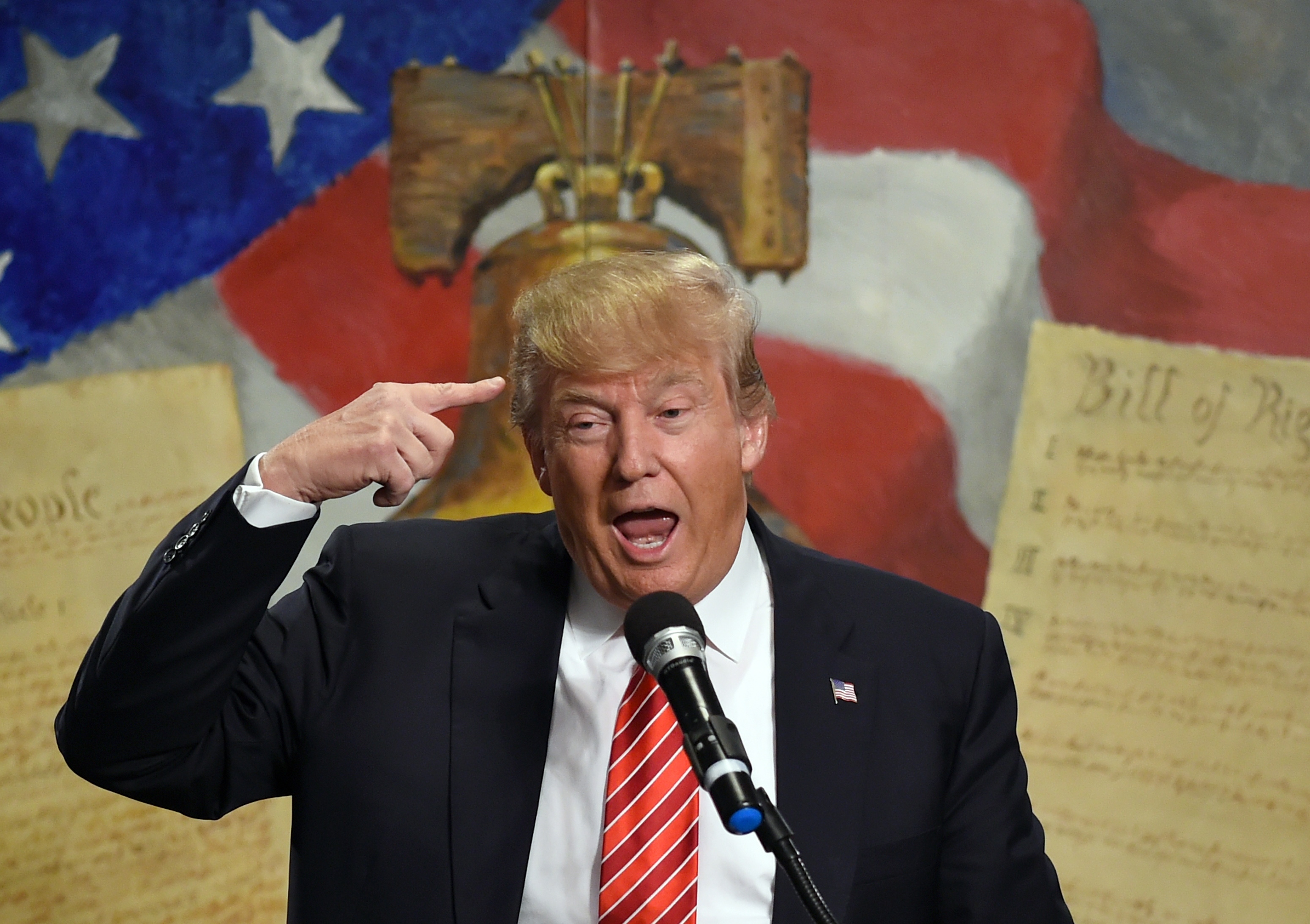The case for reading Trump
Don't watch Trump. Don't listen to him. Read him.


Writing about politics for a living means I must think about President Trump more often than is healthy to think about any person who does not live in my own household.
The man is inescapable. As Andrew Sullivan put it at New York shortly after the inauguration, Trump is always "barging into [my] consciousness." Like George Orwell's Big Brother, "His face bears down on you on every flickering screen. He begins to permeate your psyche and soul; he dominates every news cycle and issues pronouncements — each one shocking and destabilizing — round the clock."
So sometime in 2016, trying to create some mental distance from Trump for the sake of my own sanity, I stopped watching and listening to him almost entirely. Sure, there are occasional exceptions — if, for example, I'm tasked with covering a speech in real time, or if a bit of Trump happens to appear in some late-night TV clip I watch — but for the most part I avoid all video and audio recordings of the president.
The Week
Escape your echo chamber. Get the facts behind the news, plus analysis from multiple perspectives.

Sign up for The Week's Free Newsletters
From our morning news briefing to a weekly Good News Newsletter, get the best of The Week delivered directly to your inbox.
From our morning news briefing to a weekly Good News Newsletter, get the best of The Week delivered directly to your inbox.
Instead, I read him.
Transcripts are available so quickly and easily online these days that this is ever more feasible. And in the process of making this switch, I've found its benefits go well beyond clearing my mind of Trumpian clutter. Perhaps most notably, it makes it possible for me to fairly recognize when Trump gets something right.
Readers of my work here at The Week and elsewhere will know that, as a Christian and a libertarian alike, I rarely find common ground with this administration. And I confess — whether as a result of something unique about Trump, or my own lack of charity, or simply this incessant familiarity breeding an instinctive hostility — my default at this point is to assume I will disagree with whatever Trump says. When I watch Trump's words coming out of Trump's mouth, I often struggle to assess their policy content independent of the president's personal manner and history of ethically gross behavior.
Reading him helps to level my mental playing field, to evaluate what he says dispassionately and on its own merits rather than those of its source. For instance, as messy as Trump's messaging on NATO burden-sharing tends to be, I've argued that he is right to raise the question of rethinking how the United States relates to this alliance. Reading his speeches on the subject helped me see the value in what he said.
A free daily email with the biggest news stories of the day – and the best features from TheWeek.com
Lest this seem like an exercise in giving Trump more benefit of the doubt than he is due, let me now add that reading Trump is also worthwhile for those whose default reaction to him is the opposite of my own. You see, Trump is in a narrow sense an excellent salesman. He is something of a one-trick pony in this regard — his sales shtick does not work on every audience, not by a long shot — but when he's talking to his people he has this down to a science.
But here's the thing: It's a package deal. I've found when talking to older relatives who reflexively like Trump that the fastest way to get them to seriously assess whether something the president said is good and sensible is to help them hear the words without Trump himself being involved. Because reading the president (particularly if you watch him regularly) can result in hearing his words in his voice in your head, I do this by reading aloud for them a Trump statement, ideally at least one paragraph long.
As it turns out, encountering a Trump comment divorced from Trump's salesmanship changes the experience enormously. Gone is the staccato rhythm of speech, the pregnant pauses, the evocative gestures, the crude imitations of people he doesn't like. Instead, I read Trump's words out loud with normal inflection and all the enthusiasm of an 11th-grader tasked with reading the part of Brutus for the class. Granted, my sample size is small, but so far I've found this practice is universally successful at negating Trump's personal appeal and forcing my listener to examine what he says as they would if they heard it from anyone else.
Consider, for example, what may be Trump's single most famous sentence, a 285-word run-on monstrosity:
Look, having nuclear — my uncle was a great professor and scientist and engineer, Dr. John Trump at MIT; good genes, very good genes, okay, very smart, the Wharton School of Finance, very good, very smart — you know, if you're a conservative Republican, if I were a liberal, if, like, okay, if I ran as a liberal Democrat, they would say I'm one of the smartest people anywhere in the world — it's true! — but when you're a conservative Republican they try — oh, do they do a number — that's why I always start off: Went to Wharton, was a good student, went there, went there, did this, built a fortune — you know I have to give my like credentials all the time, because we're a little disadvantaged — but you look at the nuclear deal, the thing that really bothers me — it would have been so easy, and it's not as important as these lives are (nuclear is powerful; my uncle explained that to me many, many years ago, the power and that was 35 years ago; he would explain the power of what's going to happen and he was right — who would have thought?), but when you look at what's going on with the four prisoners — now it used to be three, now it's four — but when it was three and even now, I would have said it's all in the messenger; fellas, and it is fellas because, you know, they don't, they haven't figured that the women are smarter right now than the men, so, you know, it's gonna take them about another 150 years — but the Persians are great negotiators, the Iranians are great negotiators, so, and they, they just killed, they just killed us. [President Trump]
Watching and hearing Trump say this, if you're a Trump supporter, may not raise any red flags. But try reading it out loud in a normal voice, making sure not to include pauses for the nonexistent sentence breaks in the middle, and any persuasive power goes out the window. It's just the rambling of a sleep-deprived man who should have given up boasting of his college career half a century ago. It includes no articulate policy statement about the subject at hand, which is ostensibly the Iran nuclear deal.
The third advantage I've found in reading Trump is it has encouraged me to do the same thing with other politicians and public figures. I especially suggest this method when evaluating women, as it helps us sidestep petty considerations about voice and manner that too often distract from the real questions of women's competence in and contribution to the public square. I am no supporter of Hillary Clinton, for example, but I never want to see her lose elections because of something as inconsequential as her voice.
If you want to try reading Trump, the method is pretty simple. Simply Google something like "Trump State of the Union 2018 transcript" or "Trump United Nations speech transcript." Usually, multiple options — some even annotated to provide explanations and context — will be available within 12 hours. All the major news networks get transcripts of their bigger shows up in a matter of hours, too; simply Google the show name, date, and the word "transcript" and you'll find what you need.
This practice may not end up changing your opinion of Trump (or other public figures) for better or worse, and that's fine. What it will do is remove much of the drama and knee-jerk emotional engagement from your encounters with our omnipresent president. That alone is worth the extra effort.
Bonnie Kristian was a deputy editor and acting editor-in-chief of TheWeek.com. She is a columnist at Christianity Today and author of Untrustworthy: The Knowledge Crisis Breaking Our Brains, Polluting Our Politics, and Corrupting Christian Community (forthcoming 2022) and A Flexible Faith: Rethinking What It Means to Follow Jesus Today (2018). Her writing has also appeared at Time Magazine, CNN, USA Today, Newsweek, the Los Angeles Times, and The American Conservative, among other outlets.
-
 The best fanfic that got published and went mainstream
The best fanfic that got published and went mainstreamThe Week Recommends Fan fiction websites are a treasure trove of future darlings of publishing
-
 ‘Something close to a universal rallying cry’
‘Something close to a universal rallying cry’Instant Opinion Opinion, comment and editorials of the day
-
 Trump sues IRS for $10B over tax record leaks
Trump sues IRS for $10B over tax record leaksSpeed Read The president is claiming ‘reputational and financial harm’ from leaks of his tax information between 2018 and 2020
-
 The billionaires’ wealth tax: a catastrophe for California?
The billionaires’ wealth tax: a catastrophe for California?Talking Point Peter Thiel and Larry Page preparing to change state residency
-
 Bari Weiss’ ‘60 Minutes’ scandal is about more than one report
Bari Weiss’ ‘60 Minutes’ scandal is about more than one reportIN THE SPOTLIGHT By blocking an approved segment on a controversial prison holding US deportees in El Salvador, the editor-in-chief of CBS News has become the main story
-
 Has Zohran Mamdani shown the Democrats how to win again?
Has Zohran Mamdani shown the Democrats how to win again?Today’s Big Question New York City mayoral election touted as victory for left-wing populists but moderate centrist wins elsewhere present more complex path for Democratic Party
-
 Millions turn out for anti-Trump ‘No Kings’ rallies
Millions turn out for anti-Trump ‘No Kings’ ralliesSpeed Read An estimated 7 million people participated, 2 million more than at the first ‘No Kings’ protest in June
-
 Ghislaine Maxwell: angling for a Trump pardon
Ghislaine Maxwell: angling for a Trump pardonTalking Point Convicted sex trafficker's testimony could shed new light on president's links to Jeffrey Epstein
-
 The last words and final moments of 40 presidents
The last words and final moments of 40 presidentsThe Explainer Some are eloquent quotes worthy of the holders of the highest office in the nation, and others... aren't
-
 The JFK files: the truth at last?
The JFK files: the truth at last?In The Spotlight More than 64,000 previously classified documents relating the 1963 assassination of John F. Kennedy have been released by the Trump administration
-
 'Seriously, not literally': how should the world take Donald Trump?
'Seriously, not literally': how should the world take Donald Trump?Today's big question White House rhetoric and reality look likely to become increasingly blurred
